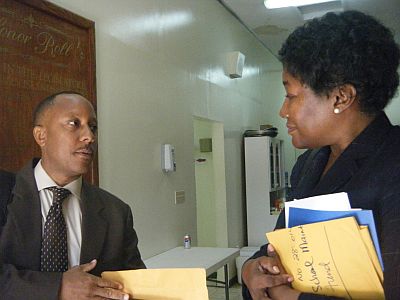
While commending senators on their interest in early childhood education, Terry added that a true program would not immediately extend to all the schools. What the money would primarily be used for is facilities, and bringing them up to par with pre-kindergarten requirements, she explained.
A $500,000 appropriation, she added, isn’t going to "make a dent" in the overall cost of establishing such a program.
Except for the programs provided by the Office of Special Education for young children with disabilities, Terry said the Department of Education “has been a missing, though key player in the early childhood arena."
"Ideally, we would like to have something like this at all the schools, but realistically, we might have to start with one to two schools per district because we have to also think about things like whether we have enough qualified teachers to take on these classes," she said.
The first thing Education would have to do in developing a program is send out a request for proposals (RFP) for a facilities assessment that would take a look at what kind of space the department has available. Pre-kindergarten classrooms, along with having "little furniture," also have to include things like inside bathrooms and family feeding areas so that teachers can keep an eye on the students, she said after the meeting.
In terms of curriculum, however, the process is a bit easier. Because the pre-kindergarten movement has recently gained momentum around the nation, curriculums have already been set up and can be adapted to fit the territory, Terry said.
Meanwhile, Human Services Commissioner Chris Finch stressed the importance of bringing both the private and public sectors into collaboration on an early childhood education system. Human Services, through programs such as Head Start, already caters to pre-kindergarten-aged students, but there is a waiting list, he added.
It’s hoped that Education’s program would target students such as these, Terry added later.
"I think the best thing to do is start addressing some of the territory’s unmet needs," she said. "Hopefully we’ll be able to take kids on the waiting list for pre-school instead of taking away students from the private businesses."
While senators’ push for the development of an early childhood education program was applauded Tuesday by the heads of the Education and Human Services departments, there were still concerns raised over whether a government-funded system would hurt private child care businesses.
This concern was initially brought up by legislative Post Auditor Jose George, who said earlier in the meeting that setting up a pre-kindergarten program in local public schools would compete with privately owned day care centers and "may create problems for local entrepreneurs in the day care business."
Wrapping up Tuesday’s meeting, senators also approved a bill — which will also be amended in Rules — exempting residents who buy hybrid or fuel-efficient vehicles from paying the highway users tax. The amendment, according to bill sponsor Sen. Terrence "Positive" Nelson, will clearly lay out the eligible categories of fuel-efficient cars and institutes a two-week "tax holiday" each year for residents who want to take advantage of the exemption.
Present during Tuesday’s hearing were Sens. Craig W. Barshinger, Carlton "Ital" Dowe, Louis P. Hill, Wayne James, Nelson, Nereida Rivera-O’Reilly, Sammuel Sanes, Patrick Simeon Sprauve and Thurland.